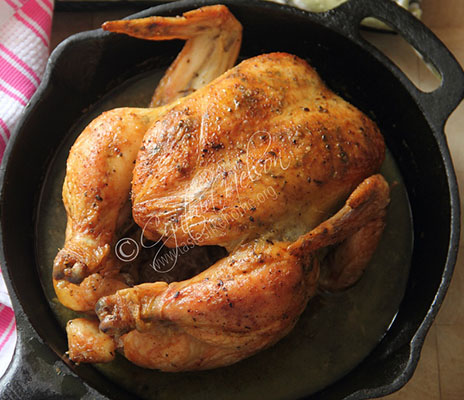
I think of my cooking these days as simple, and by simple I am referring to the ingredients I buy repeatedly every week, the manner in which they are prepared and the seasoning – salt and freshly ground black pepper. Cooking these days is easy and what I make seems to be all I have to time to make. But you know what? I do not find the food boring, and with the simple seasoning, I am experiencing the flavour of food and really tasting the ingredients with all of their inherent flavours.
Generally, when cooking ‘fried’ vegetables in the style of Guyanese cuisine, I always start by sautéing onions, garlic, fresh thyme and smashed hot peppers; sometimes celery and diced tomatoes are added to the mix of aromatics. Not so these days. The pan with oil is heated, chopped vegetables tossed in along with a seasoning of salt and black pepper, heat reduced, sometimes the pan is covered, and left to cook. The caraila/bitter melon is more pronounced (without pre-salting and wringing out the juice), however, the simple seasoning of salt and pepper compliments the bitterness and the bits of char from cooking provides a deliciously complex flavour. Ochroes/okras are sweet and actually, you don’t really need to salt them, the little heat and flavour from the black pepper is all that is needed. Salting the okras right at the end also ensures that there is no slime, but as I have said before, you cannot claim to like okra and not the slime. I’m just saying (laugh).
Pumpkin, callaloo (spinach) and bora get the same treatment – fried and seasoned with only salt and black pepper.
Dry all-purpose seasonings such as Chief’s have found favour in my kitchen. Already adequately salted, a sprinkling is all that is needed when it is used to season things like chicken, fish or shrimp. The other day I made a fine-tasting, roasted chicken with only an overnight marinating of the chicken with a rub of dry all-purpose seasoning. Cooking fish is all about a quick and simple pan-sear as is prawns. All of this makes me realize, that sometimes, as with other things in life, we ourselves can unnecessarily complicate things. Food and cooking are already fraught with issues of economics, availability, security, sourcing, class and judgement of consumption, and don’t get me wrong, these are real and serious issues. However, we can, in our own way, in the privacy and comfort of our kitchens, simplify things the best way we know how. Now, more than ever, we are bombarded with images of “perfectly” made food, poshly plated in the finest of lighting to entice us. But it also intimidates; it says, this is the way to cook, this is the way your food should look. No. That’s not the reality for the majority of us.
Cook the way you want, and in a style and manner that is reflective of you and your life. It won’t be the same always. For example, there was a period of time in my life when I cooked to remember and recall the taste of home. There was another period in my life where I cooked more at home because the cooked food I bought outside lacked taste and flavour. And there is yet another period and it continues to exist, where I cook for this column – to experiment and to share my experiences with you. Just as there are seasonal ingredients/foods, so too are there seasonal times in life when what we cook, and how we eat, gets reflected. When we entertain, we cook one way, and that is different from when we cook to feed our families daily. When we cook to feed ourselves – as in one person – we tend to stay away from dishes that are best made in large quantities. When we were accustomed to cooking for two and that loved one is no longer there, food and cooking take on a different meaning and purpose.
Food is life and food is about life. What’s your approach to cooking these days?
Cynthia
cynthia@tasteslikehome.org





